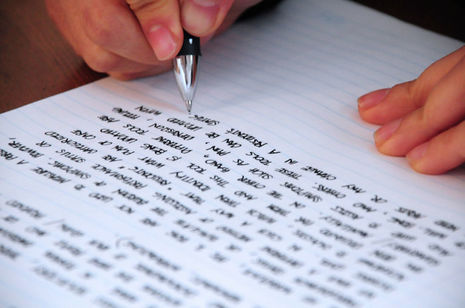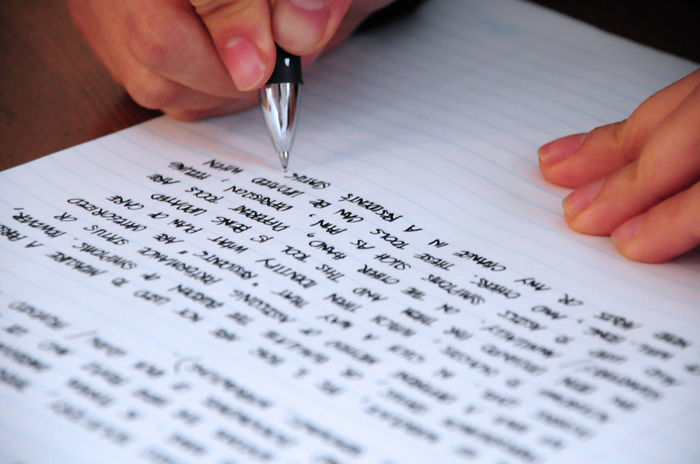Diary of a Playwright: Rejection, Reflection, Refinement
In the last of this series of Diary of a Playwright, Tom Chandler writes on the importance of taking time to reflect.

So, I sit down to write my final column. For now. In a term which contained so many ups and downs, I can’t say that I am completely surprised that I have not managed to write this article before now. The end of term for me was a crazy time, filled with non-writing related activities and punctuated with an abrupt stop as I was plunged into isolation. Such has been many creatives’ lives over the last year. However, like many before me, in isolation I found myself returning to my writing with more love than ever.
Sitting down, reading, writing and breathing for what felt like the first time in 10 weeks — the time in isolation was a surprisingly peaceful week. Despite being trapped in my Cambridge room, it felt like coming home, being able to wrap myself in delicately woven narratives while weaving my own. I sat down with my manuscript for the first time since a second rejection from the ADC and considered where it was going.
I remember in primary school having the basics of narrative theory explained to us — a beginning, middle and end — plotted out on a mountain. The mountain’s peak is the climax. We’re told this is how stories go: there’s a steady climb to the top, and then plain sailing down the other side. Of course, since then I have engaged more critically with different narrative forms — the three act structure of films, the five act structure of Shakespeare, even more experimental forms which have no clearly delineated start or finish — but I don’t think that we, as people, ever truly move away from the mountain structure.
We expect there to be a peak; if we just work hard we will definitely get there and then it will be easy. People have this with life goals, getting into a certain uni for example, but when you reach that peak, it’s very rare that the other side of the mountain is as easy as you think. It’s also rare, I feel, for the journey to that peak to be as linear as you hope — it’s more often than not a winding path, riddled with Indiana-Jones-style booby traps, from rejections to broken arms to isolation.
“We’re told this is how stories go — there’s a steady climb to the top, and then plain sailing down the other side”
Rejection is something creatives get used to, but that doesn’t mean it’s always easy. Having the time in isolation, to think and to rest, has really allowed me to stop and reflect on the path behind me and take a more measured approach to the path ahead. To an extent, this term has been proof that nothing can be taken for granted and we must plan for a number of eventualities — or better yet, learn to adapt to whatever is thrown at us with little resistance.
Luckily, the path over this summer is my own to plan and design, and I would urge every writer to do the same as far as possible. I have two cracking play ideas to refine and/or get off the ground. Of course, I won’t just be writing, I am looking forward to getting stuck back into reading too — particularly using the online resource of Drama Online (which is available for all University of Cambridge students to use!) and various streaming services.
One of my most exciting tasks for the Long Vac is going to be doing some more short-form writing; 10-20 minute plays, duologues and monologues, to get creative juices flowing and to explore new forms and genres. During term I, almost paradoxically, find it harder to write these short pieces — perhaps because it frequently requires more fresh and original thought, while working on one or two bigger projects allows dipping in and out easier, as you have a clearer idea of what needs to be done, as long as you have planned well. I find these exercises in pushing my boundaries and styles to be immensely helpful in practicing and refining my writing.
Monologue writing often helps character work — I’ll write ones for characters which I am struggling with in my larger works to get a better sense of their voice and tone. Sometimes these characters can even act as standalone individuals — a character I wish to dip into but never visit again. Additionally, I use duologues to help with refining the pace and tempo of writing dialogue. I find this is one of my weaker areas; trying to make sure my writing isn’t unnecessarily stilted or slow. I often use shorter pieces to experiment with form and structure without committing to experimental or abstract techniques across a full-length piece. These exercises in refinement of style and skill tend to go nowhere and don’t see the light of day, unless I have a particularly interested and trusted friend with whom I can share them and get feedback.
Sometimes the characters join my bigger projects, sometimes the duologues get subsumed into larger narratives, sometimes I like the new form or genre I have stumbled upon and expand it into a full blown piece. On the other hand, sometimes none of these happen and the files just sit on my hard drive, collecting virtual dust. That’s fine, because practice is practice, no matter where it goes.
“I find these exercises in pushing my boundaries and styles to be immensely helpful in practicing and refining my writing”
I feel that the new academic year holds so many promising opportunities for writers old and new; I’m particularly excited to see what the incoming batch of freshers has to offer to our theatre scene. Many of 2020’s cohort are hoping that we can finally experience Cambridge Theatre free from the shackles of COVID and get the chance to write and see more across the whole university in previously closed venues.
So, while I get stuck into my summer projects, I wish any writers or potential writers out there all the best, and I thank you for your time in reading my musings on being a playwright. I’m not quite the bard, but I hope it was entertaining nonetheless.
 News / SU reluctantly registers controversial women’s soc18 December 2025
News / SU reluctantly registers controversial women’s soc18 December 2025 Features / Should I stay or should I go? Cambridge students and alumni reflect on how their memories stay with them15 December 2025
Features / Should I stay or should I go? Cambridge students and alumni reflect on how their memories stay with them15 December 2025 News / Dons warn PM about Vet School closure16 December 2025
News / Dons warn PM about Vet School closure16 December 2025 News / Cambridge study finds students learn better with notes than AI13 December 2025
News / Cambridge study finds students learn better with notes than AI13 December 2025 News / Uni registers controversial new women’s society28 November 2025
News / Uni registers controversial new women’s society28 November 2025










